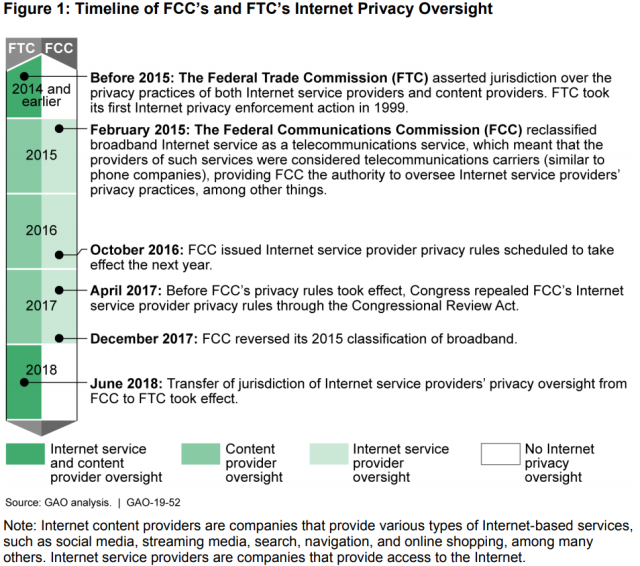Your Internet Privacy
Do you shop or bank online? Use the Internet to stay connected with friends and family? Internet-based products and services regularly collect and share personal information about users, such as location, search terms and browsing history, contact information, and financial data.
We’ve looked at how federal agencies oversee Internet privacy and potential ways to better protect consumers—today’s WatchBlog explores.
Concern with every click
Recent incidents have raised public concern about the misuse of consumers’ personal information from the Internet. In 2018, FTC found in an investigation that PayPal had misled consumers about privacy of financial transactions and in 2017 FTC determined that Vizio, a company that makes Smart TVs, tracked consumers’ television viewing without consumers’ knowledge or consent. Incidents like these may make Americans wary of using some Internet services. According to the National Telecommunications and Information Administration, 24 percent of American households surveyed in 2017 avoided making financial transactions on the Internet due to privacy or security concerns.
Who protects your data?
The United States, unlike the European Union, does not have a comprehensive Internet privacy law. The Federal Trade Commission, which protects consumers from unfair and deceptive trade practices, leads efforts to oversee Internet privacy. However, we found that FTC has not issued regulations for Internet privacy other than ones protecting the privacy of children. FTC staff said its rulemaking procedures, which differ from what most agencies traditionally use, add time and complexity to the process. In the last decade, FTC filed 101 enforcement actions related to Internet privacy against companies but did not have the authority to impose fines for most violations.
Improving consumer protection
Most industry stakeholders we interviewed said they favored FTC’s current approach to Internet privacy because it allowed for flexibility and innovation. But others—including consumer advocates and most former FTC commissioners—thought more could be done to protect consumers’ privacy online. They identified three areas in which federal oversight could be enhanced:
- An overarching Internet privacy law could enhance consumer protection by clearly articulating what behaviors are prohibited.
- Regulations regarding Internet privacy could provide clarity, enforcement fairness, and flexibility.
- FTC’s Internet privacy enforcement could be more effective if it had additional authority to impose fines for violations.
We recommended that Congress consider developing comprehensive legislation on Internet privacy that would enhance consumer protections and provide flexibility to address a rapidly evolving Internet environment.
Listen to our podcast with directors Alicia Puente Cackley and Mark Goldstein to hear more about the government’s role in securing personal information online:
Interested in learning more? Check out our other reports on Internet privacy:
- Internet of things: As more devices become connected, there are increased opportunities for privacy breaches.
- Vehicle data privacy: Most selected automakers reported limiting their data collection, use, and sharing, but their written notices did not clearly identify data sharing and use practices.
- Information resellers: No overarching federal privacy law governs the collection and sale of personal information among private-sector companies, including resellers. We recommended that Congress consider strengthening the consumer privacy framework; such legislation has not been enacted.
- Mobile device location data: According to privacy advocates, consumers are generally unaware of how their location data are shared with and used by third parties.
Comments on GAO’s WatchBlog? Contact blog@gao.gov.







